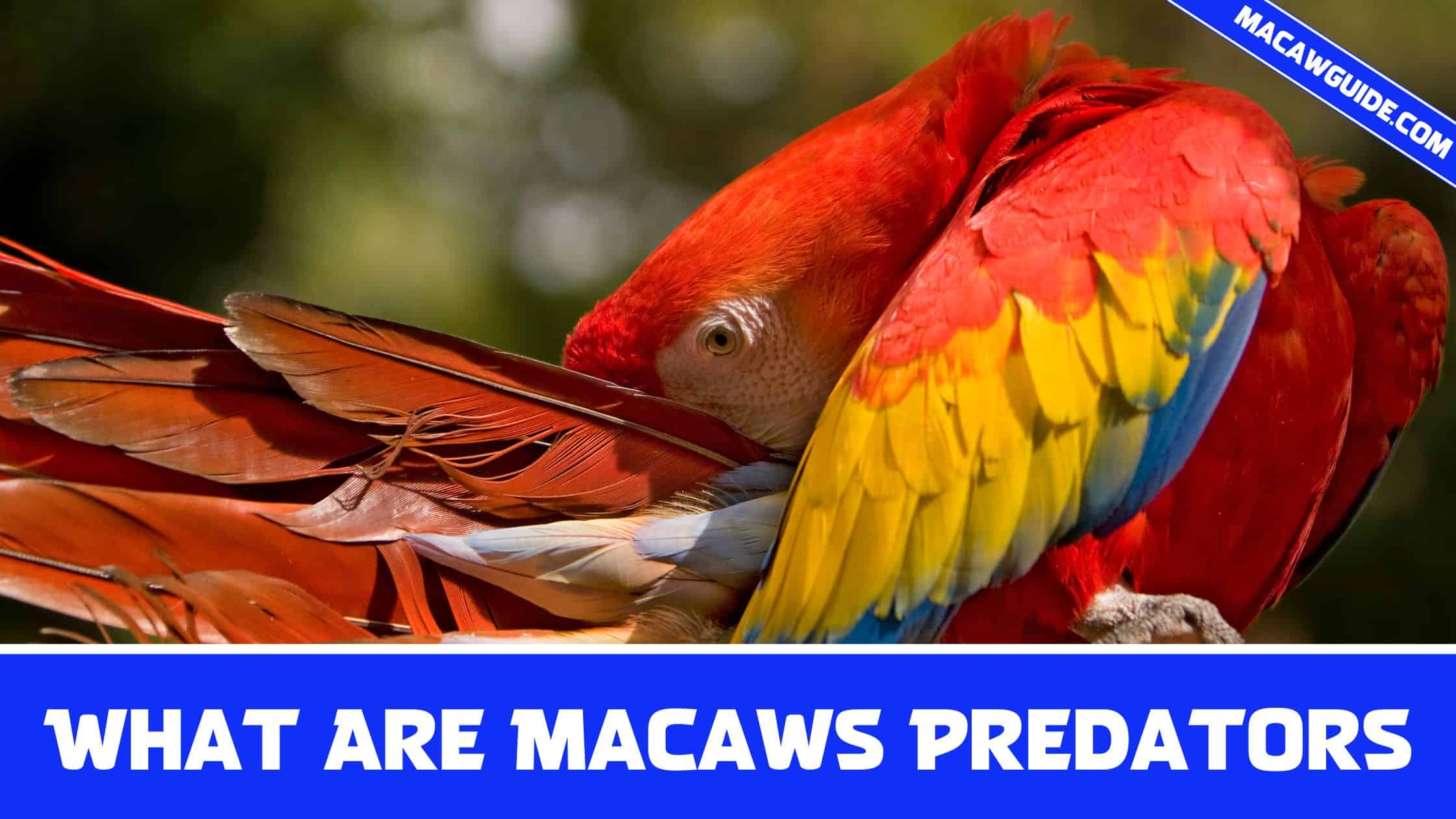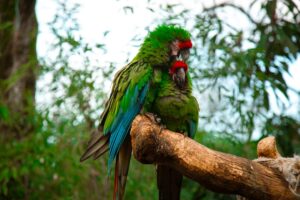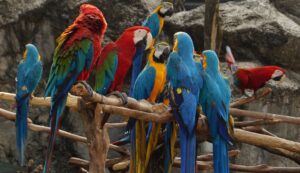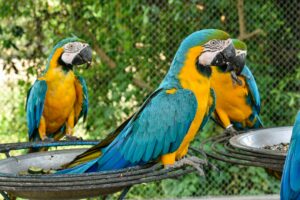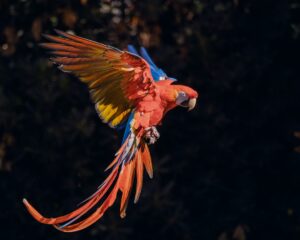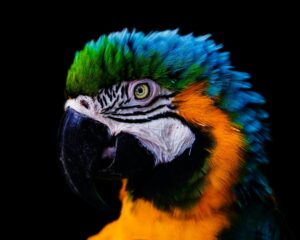What Are Macaws Predators?: Macaws are stunning and colourful birds found in tropical areas.
Whereas they’re known for their placing plumage and playful nature, they don’t seem to be without their share of natural predators.
These predators can pose a risk to Macaws, particularly their younger ones.
Let’s discover who some of these predators are and the challenges macaws face in their natural habitats.
Table of Contents
- 1 What Are Macaws Predators?
- 2 Natural Predators Of Macaws
- 3 What Birds Prey on Macaws?
- 4 Which Animals Eat Macaws?
- 5 Can A Mammal Prey on Macaws?
- 6 Can Humans Eat Parrots?
- 7 How Do Parrots Escape From Predators?
- 8 How does climate change affect macaw populations and their habitats?
- 9 Frequently Asked Questions (FAQs)
- 10 Conclusion
What Are Macaws Predators?
Macaws with their strikingly colourful feathers and playful personalities, are fascinating birds that captivate our hearts.
However, like all creatures within the wild, macaws have their fair proportion of natural predators.
Read Also,
These are animals that see macaws as a potential meal or risk.
On this article, we’ll discover who some of these predators are and the way they impact macaw populations.
Birds of Prey
Larger birds of prey like hawks and eagles are expert hunters.
They possess sharp talons and robust beaks, which they use to seize prey.
Macaws whereas agile in flight, usually are not all the time a match for these raptors.
These birds of prey typically goal macaws when they’re in flight or when they’re perched in uncovered areas.
It is a fixed sport of survival for macaws as they should be vigilant to avoid these aerial predators.
Snakes
Some snake species are recognized to be macaw nest raiders.
They’ll sneak into macaw nests, which are sometimes in tree hollows or cavities, and quietly feast on the eggs or chicks.
That is particularly regarding in the course of the breeding season when macaws are targeted on elevating their younger.
The presence of snakes close to their nests can result in the loss of treasured macaw offspring.
Mammalian Predators
Larger mammals, together with monkeys and raccoons, are opportunistic feeders and may threaten macaws.
Monkeys, particularly, are expert climbers and may attain macaw nests excessive within the bushes.
These mammals would possibly raid macaw nests to steal eggs or catch macaw chicks.
This fixed risk implies that macaw mothers and fathers should all the time be on alert to guard their offspring.
Toucans
Toucans, with their massive payments, are a surprising risk to macaws. They’re recognized to raid macaw nests, particularly in the course of the breeding season.
Toucans can use their payments to interrupt macaw nests and snatch eggs or chicks.
This competitors for nesting websites and sources generally is a problem for macaws.
Large Mammals
In sure areas, Larger mammals like ocelots and jaguars can pose a hazard to macaws.
These massive cats usually are not solely expert climbers however are additionally opportunistic hunters.
They could try to catch Macaws particularly when different meal sources are scarce. This may add one other layer of danger to macaw populations.
Humans
Whereas Humans usually are not natural predators of Macaws they’ve had a big impact on their populations.
Unlawful wildlife commerce and habitat destruction resulting from human actions have threatened macaws.
These birds are generally captured and offered as unique pets, additional endangering their numbers.
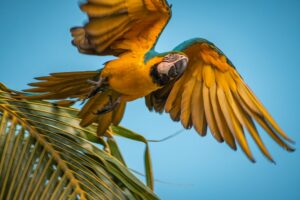
Competition for Nesting Sites
Macaws significantly the Larger species, typically need to compete with different hen species for appropriate nesting websites.
In areas the place tree cavities or hollows are restricted, they may face competitors from parrots or different hen species for nesting areas.
This competitors can impact their potential to search out safe websites to boost their younger.
Deforestation
Deforestation is a big risk to macaw populations.
It not solely leads to the loss of their natural habitat but in addition exposes them to elevated dangers from predators.
With fewer bushes and fewer cowl, macaws develop into extra susceptible to predation.
Deforestation additionally limits their entry to meals sources, additional affecting their survival.
Climate Change
Whereas not direct predators, the altering Climate not directly impacts macaws.
Climate change can alter their habitats and meals sources, making it more difficult for these birds to search out the diet they want.
Excessive climate occasions, corresponding to hurricanes and droughts, may also disrupt their habitats and expose them to elevated dangers from predators.
Illegal Capture
These involved within the unlawful seize and commerce of macaws pose a grave danger to their populations.
Though not conventional predators, these Humans threaten macaws by capturing them for the pet commerce.
The seize and transport process is commonly disturbing and dangerous to the birds, resulting in a big decline in their populations.
Natural Predators Of Macaws
Avian Predators
Macaws with their vibrant plumage and enormous measurement, would possibly appear to be formidable creatures, however they’ve their share of natural predators.
Among the many most vital avian threats are raptors, together with eagles and hawks.
These birds of prey are recognized for their sharp talons and eager eyesight, which make them expert hunters.
They typically goal macaw chicks or weak and injured grownup birds.
These raptors will swoop down from the sky to seize their prey, utilizing shock assaults to grab macaws from the bushes or throughout their flight.
Whereas macaws are agile fliers and may make swift escapes, significantly in open areas, they are often susceptible when perched or feeding.
Avian predators pose a continuing risk to macaw nests in the course of the breeding season, and these interactions are a component of the natural ecosystem dynamics in their habitats.
The predation of macaws by avian predators, although a natural incidence, can nonetheless have ecological penalties.
The loss of Macaws as each prey and seed dispersers, can disrupt the ecosystem balance.
This makes it essential to take care of wholesome macaw populations and defend their nesting websites from undue disturbance.
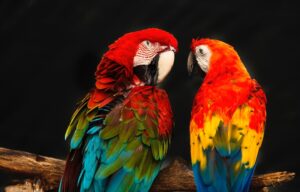
Mammalian Predators
Macaws whereas recognized for their placing magnificence and vibrant plumage, are additionally recognized to be a prime goal for varied mammalian predators in their natural habitat.
These predators embrace jaguars, ocelots, and varied species of massive snakes.
Jaguars, as apex predators, are particularly formidable. They’ve highly effective jaws and claws, permitting them to climb bushes with ease and entry macaw nests.
Ocelots are additionally expert climbers and are recognized for their potential to stealthily method macaw nests and seize chicks or grownup birds.
Giant snakes corresponding to boas and pythons are recognized to be opportunistic predators, slithering up bushes to raid macaw nests, capturing each younger and grownup birds.
The risk of these mammalian predators is most vital in the course of the breeding season when macaws are actively nesting and elevating their younger.
Throughout this time, nests are extra uncovered, and predators can take benefit of this vulnerability.
Whereas the interactions between macaws and mammalian predators are a natural half of their ecosystem, the decline of macaw populations resulting from habitat loss and different human-induced components has made these interactions extra vital.
Defending macaws and their nesting websites from these mammalian predators is an important side of macaw conservation efforts, making certain that these iconic birds proceed to thrive in their natural atmosphere.
Reptilian Predators
In their natural habitat, macaws face threats not solely from avian and mammalian predators but in addition from reptilian predators.
Amongst these reptiles, snakes are probably the most distinguished.
Giant snake species like boas and pythons have tailored to climb bushes and may entry macaw nests with relative ease.
These reptiles are opportunistic predators and are recognized to raid macaw nests, capturing each chicks and, at occasions, grownup macaws.
The risk of reptilian predators is especially pronounced in the course of the macaw breeding season when nests are extra uncovered and susceptible.
The snakes’ potential to climb bushes and shock macaw households in their nests makes them a big concern for macaw conservationists.
Whereas these reptilian predators play a role within the natural ecosystem, human-induced components corresponding to habitat destruction and deforestation have exacerbated the risk.
By defending macaw nesting websites and monitoring for the presence of these reptiles, conservationists work to mitigate the impact of reptilian predators on macaw populations.
General, understanding the dynamics between macaws and their natural predators is important for formulating efficient conservation strategies.
By addressing these threats, it’s potential to assist make sure the survival and well-being of macaw populations in their native habitats.
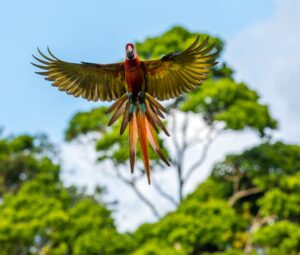
What Birds Prey on Macaws?
Within the colourful world of Macaws there are a number of feathered foes that pose a risk to those vibrant birds. Whereas macaws are massive and highly effective, they don’t seem to be invulnerable.
Some Larger birds within the forests could goal macaws as a component of their meal. These predators embrace birds of prey like hawks and eagles, that are expert hunters with sharp talons and eager eyesight.
These raptors can swoop down on Macaws making them susceptible, particularly after they’re flying or perched within the bushes.
One other group of hen predators consists of toucans, which could appear shocking.
Toucans are recognized for their distinctive payments and vibrant colors, very similar to macaws.
Nevertheless, some toucan species are opportunistic feeders and will take benefit of macaw nests after they discover the possibility.
These raids can lead to the loss of macaw eggs or younger chicks.
Monkeys, whereas not birds, are additionally predators that macaws have to be careful for.
Monkeys are agile climbers, they usually can scale bushes to succeed in macaw nests. They could snatch macaw chicks if they will get to them.
This poses a big risk to macaw populations, as monkeys may be fairly expert at discovering and raiding nests.
Whereas these predators are on the market, macaws have developed some strategies to guard themselves.
They typically nest in tree hollows, which may be more durable for predators to entry.
Macaws even have loud calls and alert one another when hazard is close to, which may help them avoid being caught off guard.
Nonetheless, the colourful and majestic macaws nonetheless need to hold an eye fixed out for these potential threats in their natural habitats.
Which Animals Eat Macaws?
Various animals are recognized to eat macaws.
Macaws are massive and colourful parrots present in tropical areas, they usually have some natural predators in their ecosystems.
Listed below are some of the animals that will prey on macaws:
Birds of Prey
Larger birds of prey like eagles and hawks are recognized to hunt macaws.
These birds have sharp talons and beaks, which make them formidable hunters.
Snakes
Some snake species are expert climbers and may attain macaw nests in bushes.
They’ll pose a risk to each grownup macaws and their eggs or chicks.
Mammals
Certain massive mammals, corresponding to monkeys, could goal macaws.
They are often agile climbers and will raid macaw nests for meals.
Toucans
Toucans are one other kind of hen that will compete with macaws for meals.
Whereas they may not be major predators, they will probably hurt macaws in territorial disputes.
Other Birds
In some cases, smaller birds would possibly harass or assault Macaws particularly in the event that they really feel threatened or need to declare territory.
Can A Mammal Prey on Macaws?
Yes, mammals can certainly prey on macaws. Macaws are colourful parrots recognized for their vibrant feathers and playful personalities, however they don’t seem to be resistant to natural threats.
In their tropical habitats, varied mammals pose dangers to those birds.
One common group of predators is massive mammals. Animals like monkeys, that are agile and have dexterous arms, can generally goal macaw nests.
They could steal eggs or younger chicks, posing a big risk to the subsequent technology of macaws.
Toucans, with their sharp payments, are one other group of macaw predators.
Whereas they primarily feed on fruits, they could resort to predation when the chance arises.
Their robust beaks generally is a hazard to Macaws particularly when they’re small or susceptible.
Snakes are stealthy predators that may sneak into macaw nests to grab eggs or chicks.
Their potential to slither into small areas makes them a big risk to nesting macaws.
Along with these creatures, different massive mammals within the macaw’s habitat would possibly view them as a potential supply of meals.
Whereas macaws are expert fliers, they don’t seem to be invulnerable.
In some circumstances, Larger birds within the forests could catch wild macaws to incorporate them in their meals.
So, sure, mammals and different animals can certainly prey on macaws.
Whereas these birds are recognized for their magnificence and intelligence, they nonetheless need to be careful for the predators that share their tropical houses.
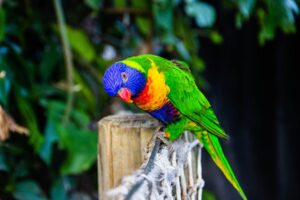
Can Humans Eat Parrots?
Yes, Humans can technically eat parrots, however, it’s kind of extra sophisticated than an easy “sure” or “no.”
Consuming parrots is not a common apply in most components of the world, and there are a number of necessary issues to remember.
First, parrots usually are not a common meals supply in lots of cultures.
They’re extra generally saved as pets or admired for their magnificence and intelligence.
In some international locations, corresponding to components of South America, parrots have been hunted for their meat, however this apply is just not widespread and is commonly discouraged resulting from issues about conservation and wildlife safety.
Second, the legality of consuming parrots varies by area and is commonly topic to strict regulations.
Many parrot species are protected by worldwide and nationwide legal guidelines to stop their looking and commerce.
Consuming parrots with out correct authorization can result in authorized penalties, together with fines and imprisonment.
The consumption of parrots raises moral issues.
These birds are extremely smart and social creatures, and retaining them as pets or consuming them as meals may be seen as a violation of their rights and welfare.
Many animal rights and conservation organizations advocate for the safety of parrots and their habitats.
Lastly, there are well being issues to remember.
Parrots can carry illnesses, and consuming them with out correct preparation and cooking can pose well being dangers to Humans.
The parrot meat is completely cooked to kill any potential pathogens.
Whereas it is technically potential for Humans to eat parrots in some locations, it isn’t a common or extensively accepted apply.
Legal, moral, and well being issues all come into play, making it a fancy issue.
In most components of the world, folks don’t devour parrots, and there’s a robust give attention to defending these clever and colourful birds.
How Do Parrots Escape From Predators?
Parrots make use of a spread of strategies to flee from predators, showcasing their adaptability and intelligence.
Whereas they is probably not the quickest or strongest birds, their survival ways are fairly efficient. Listed below are the important thing factors:
1. Vigilance
Parrots have distinctive eyesight, which they use to continuously scan their environment for hazard.
In the event that they spot a predator, they react swiftly by sounding loud alarms and withdrawing to security.
2. Squadron Defense
Parrots typically form flocks, which supply safety in numbers.
When threatened, they take to the sky in coordinated flight patterns, making it difficult for predators to single out a person parrot.
3. Distracting Techniques
Parrots are adept at diverting the eye of predators.
They could mimic different hen calls or create loud, distracting noises to confuse and disorient potential threats.
4. High-Speed Flight
Whereas parrots is probably not the quickest flyers, they make up for it with their agility. They’ll navigate through bushes and branches swiftly, making it troublesome for predators to catch them.
5. Seeking Shelter
After they sense danger, parrots typically search refuge in dense foliage.
Their vibrant plumage blends in with the atmosphere, making it more durable for predators to succeed in them.
How does climate change affect macaw populations and their habitats?
Climate change has a big impact on macaw populations and their habitats.
These colourful birds, recognized for their vibrant plumage, usually are not solely fascinating but in addition susceptible to the altering climate. This is how Climate change impacts them:
Habitat Loss
Climate change can result in shifts in temperature and rainfall patterns, altering the ecosystems the place macaws stay.
This can lead to habitat loss because the vegetation macaws rely on could not have the ability to survive within the new circumstances.
With out correct meals and shelter, macaw populations can decline.
Food Scarcity
Macaws depend on sure fruits, seeds, and nuts as their major meals supply.
Climate change can affect the provision and abundance of these meals.
Droughts, floods, and altering temperatures can disrupt the expansion and distribution of these important meals, making it more durable for macaws to search out the diet they want.
Extreme Weather
Extra frequent and extreme weather occasions are a consequence of Climate change.
Hurricanes, storms, and wildfires can destroy macaw habitats and nests.
These occasions can result in the loss of macaw eggs, chicks, and grownup birds.
Spread of Diseases
Hotter temperatures can facilitate the spread of diseases.
Macaws may be susceptible to illnesses transmitted by parasites or different birds.
With Climate change, these diseases can develop into extra widespread, placing macaw populations in danger.
Nesting Challenges
Macaws normally nest in tree hollows or cavities.
Climate change can impact the well being and availability of bushes, making it more durable for them to search out appropriate nesting websites.
This may reduce their breeding success.
Migration Disruption
Some macaw species migrate to search out meals and appropriate breeding areas.
Climate change can affect the timing and places of these migrations.
Adjustments in temperature and meals availability alongside their migration routes may be detrimental to their survival.
Increased Competition
As climate change impacts habitats and meals sources, macaws could need to compete with different species for restricted sources.
This competitors can result in decreased macaw populations, particularly if they can not adapt rapidly.
Loss of Genetic Diversity
Climate change can power macaw populations to adapt or relocate.
In some circumstances, this could result in isolation and smaller populations.
Diminished genetic variety could make them extra vulnerable to diseases and environmental changes.
Frequently Asked Questions (FAQs)
Q. What are macaws’ natural predators?
A. Macaws face a number of natural predators in their habitats, together with birds of prey, snakes, massive mammals, and even some monkeys.
Q. Do macaws live in flocks for protection?
A. Yes, many macaw species live in flocks as a protection mechanism. Security in numbers helps deter predators, they usually can collectively react to threats.
Q. How do macaws respond to predators?
A. Macaws have completely different responses to predators. They could sound loud alarms, take to the sky, have interaction in distracting behaviors, or search shelter in dense foliage.
Q. Are there any unique escape tactics macaws use?
A. Yes, macaws typically exhibit mobbing conduct, the place they collect round a predator to create chaos and discomfort. They’ll also mimic different hen calls to confuse threats.
Q. Do all macaw species have the same predators?
A. Whereas some predators are common to most macaw species, the precise threats can range relying on their location and habitat.
Conclusion
Macaws with their vibrant plumage and interesting personalities, should navigate a world with varied natural predators.
These embrace birds of prey, snakes, massive mammals, and even sure monkeys.
To counter these threats, macaws have developed ingenious strategies.
They typically stay in protecting flocks, use vigilance, and show mobbing behaviors.
Their intelligence and skill to study from previous encounters make them remarkably adaptable in dealing with the challenges of their natural habitats.
By using these ways, macaws manage to thrive within the midst of potential threats, making certain their colourful presence continues to grace our tropical landscapes.
If you found the information on this “What Are Macaws Predators?” post useful, we encourage you to share it with your pals and followers on social networks resembling Facebook, Twitter, and different social media platforms.
Your sharing helps spread the information and insights we have offered to a wider audience, benefiting others who may find it helpful.

My name is Richard and I’m the founder of macawguide.com. The name macawguide, was chosen to make the site more memorable since we’re providing helpful information about macawpet and their behavior.

